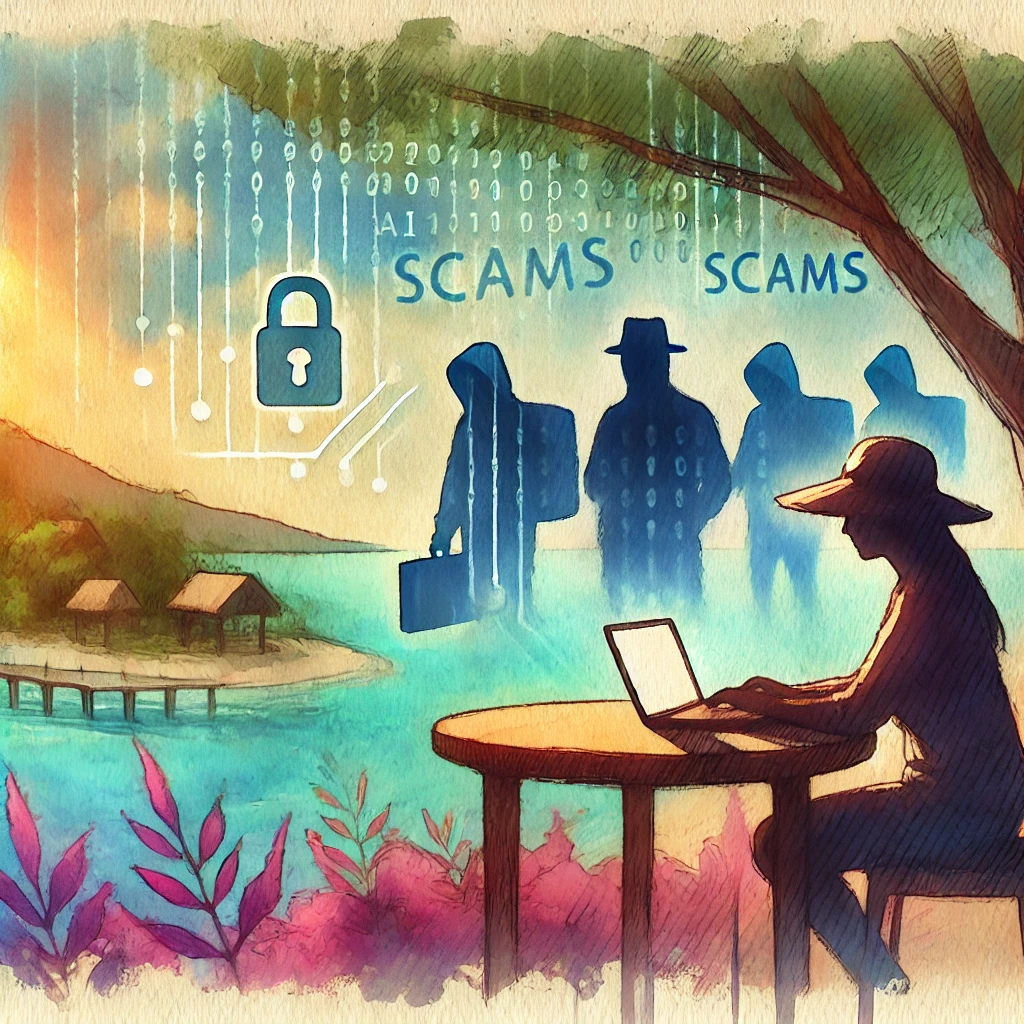People are getting tricked when they book trips online. Bad people use smart computers to make fake emails and websites. These tricks make people give away their money and personal information. Booking.com says everyone should be careful and use extra safety steps, like two-factor authentication. This means you need two ways to prove who you are before you can log in.
Booking.com is also using smart computers to find and remove fake hotels from their website. They want to stop the bad people before anyone gets tricked. Experts say travel companies should tell people more about these tricks. They suggest checking details carefully and using credit cards for safety. This way, people can stay safe when booking their trips.
Original news source: Booking.com warns of up to 900% increase in travel scams (BBC)
🎧 Listen:
Slow
Normal
Fast
📖 Vocabulary:
| 1 | tricked | Fooled or deceived |
| 2 | book | To reserve or arrange something in advance |
| 3 | fake | Not real, pretend |
| 4 | prove | Show that something is true |
| 5 | remove | Take something away |
| 6 | experts | People who know a lot about something |
| 7 | suggest | To give an idea or advice |
| 8 | details | Small parts or pieces of information |
| 9 | careful | Watching out for danger |
| 10 | safety | Being free from harm or danger |
Group or Classroom Activities
Warm-up Activities:
– Charades
Instructions: Divide the class into two teams. Give each team a set of travel-related words or phrases written on separate pieces of paper. One person from each team will come to the front of the class and act out the word or phrase silently, while their teammates try to guess what it is. The team that guesses correctly gets a point. Repeat with different students acting out the words or phrases until all of them have been used. The team with the most points wins.
– Vocabulary Pictionary
Instructions: Divide the class into pairs. Give each pair a set of travel-related vocabulary words or phrases written on separate pieces of paper. One person from each pair will choose a word or phrase and draw a picture to represent it, while their partner tries to guess what it is. The pair that guesses correctly earns a point. Switch roles and repeat with different words or phrases until all of them have been used. The pair with the most points wins.
– Speed Summarizing
Instructions: Give each student a copy of the article. In pairs, students take turns summarizing the article to their partner in 1 minute or less. The partner should listen and try to understand the main points of the article. After each round, students switch roles. Repeat several times with different sections of the article. Encourage students to use their own words and not read directly from the article.
– Keyword Taboo
Instructions: Write a list of key words from the article on the board. Divide the class into two teams. One student from each team will come to the front of the class. Their team members must try to get them to guess the key word without using the word itself or any forms of the word. The team that successfully guesses the most key words in a given amount of time wins.
– Future Predictions
Instructions: In pairs, students discuss and make predictions about the future of online travel booking. They should use the information from the article to support their ideas. After discussing, each pair shares their predictions with the class. Encourage students to use future tenses and modal verbs to express their predictions.
🤔 Comprehension Questions:
1. What are bad people doing to trick others when they book trips online?
2. What does Booking.com suggest people do to be safe when booking trips online?
3. How many ways do you need to prove who you are before you can log in with two-factor authentication?
4. What is Booking.com doing to find and remove fake hotels from their website?
5. What do experts say travel companies should do to help people avoid getting tricked?
6. What should people do to stay safe when booking their trips online?
7. Why is it important to use credit cards for safety when booking trips online?
Go to answers ⇩
🎧✍️ Listen and Fill in the Gaps:
People are getting tricked when they book trips online. Bad (1)______ use smart computers to make fake emails and websites. These tricks make people (2)______ away their money and personal information. Booking.com says everyone should be careful and use extra safety steps, like two-factor authentication. This (3)______ you (4)______ two ways to prove who you are before you can log in.
Booking.com is also (5)______ smart computers to find and remove fake hotels from their website. They want to stop the bad people before anyone gets tricked. (6)______ say travel companies should tell people more about these tricks. They suggest checking details carefully and using (7)______ cards for safety. This way, people can stay safe when (8)______ their trips.
Go to answers ⇩
💬 Discussion Questions:
Students can ask a partner these questions, or discuss them as a group.
1. What is a trick?
2. How would you feel if someone tricked you out of your money?
3. Do you like booking trips online? Why or why not?
4. What is two-factor authentication?
5. How do smart computers help Booking.com?
6. Do you think travel companies should tell people more about tricks? Why or why not?
7. Why is it important to check details carefully when booking a trip?
8. Do you use credit cards for safety? Why or why not?
9. What are some ways people can stay safe when booking trips online?
10. How do you prove who you are when you log in to a website?
11. Have you ever been tricked online? How did it make you feel?
12. What would you do if you found a fake hotel on a website?
Individual Activities
📖💭 Vocabulary Meanings:
Match each word to its meaning.
Words:
1. tricked
2. book
3. fake
4. prove
5. remove
6. experts
7. suggest
8. details
9. careful
10. safety
Meanings:
(A) Take something away
(B) Small parts or pieces of information
(C) Being free from harm or danger
(D) People who know a lot about something
(E) Fooled or deceived
(F) To give an idea or advice
(G) Watching out for danger
(H) To reserve or arrange something in advance
(I) Not real, pretend
(J) Show that something is true
Go to answers ⇩
🔡 Multiple Choice Questions:
1. How do bad people trick others when booking trips online?
(a) They send real emails and websites.
(b) They give away their money and personal information.
(c) They use smart computers to make fake emails and websites.
(d) They use two-factor authentication.
2. What is two-factor authentication?
(a) When you need one way to prove who you are before you can log in.
(b) When you don’t need to prove who you are before you can log in.
(c) When you need three ways to prove who you are before you can log in.
(d) When you need two ways to prove who you are before you can log in.
3. What is Booking.com doing to stop the bad people?
(a) They are tricking people into giving away their money and personal information.
(b) They are telling people more about these tricks.
(c) They are using smart computers to find and remove fake hotels from their website.
(d) They are using credit cards for safety.
4. What do experts suggest people do to stay safe when booking trips?
(a) Give away their money and personal information.
(b) Use two-factor authentication.
(c) Use smart computers to find and remove fake hotels.
(d) Check details carefully and use credit cards for safety.
5. Why should people be careful when booking trips online?
(a) Because bad people use smart computers to make fake emails and websites.
(b) Because Booking.com is using smart computers to find and remove fake hotels.
(c) Because experts suggest checking details carefully and using credit cards for safety.
(d) Because two-factor authentication is important.
6. What is one extra safety step that people can take when booking trips online?
(a) Use two-factor authentication.
(b) Give away their money and personal information.
(c) Use smart computers to find and remove fake hotels.
(d) Use credit cards for safety.
7. What does Booking.com want to do before anyone gets tricked?
(a) Use two-factor authentication.
(b) Stop the bad people.
(c) Tell people more about these tricks.
(d) Use credit cards for safety.
8. What does two-factor authentication mean?
(a) When you need one way to prove who you are before you can log in.
(b) When you need two ways to prove who you are before you can log in.
(c) When you don’t need to prove who you are before you can log in.
(d) When you need three ways to prove who you are before you can log in.
Go to answers ⇩
🕵️ True or False Questions:
1. Booking.com says everyone should be careful and use extra safety steps.
2. Some bad people use computers to trick others when they book trips online.
3. They want to let the bad people continue tricking people without interference.
4. Booking.com is using smart computers to find and remove fake hotels from their website.
5. They propose ignoring details casually and avoiding credit cards for safety.
6. Experts say travel companies should tell people more about these tricks.
7. Two-factor authentication means you only need one way to prove who you are before you can log in.
8. These tricks make people keep their money and personal information secure.
Go to answers ⇩
📝 Write a Summary:
Write a summary of this news article in two sentences.
Check your writing now with the best free AI for English writing!
Writing Questions:
Answer the following questions. Write as much as you can for each answer.
Check your answers with our free English writing assistant!
1. What are bad people doing online?
2. How do they trick people?
3. What does Booking.com say people should do to stay safe?
4. How is Booking.com finding and removing fake hotels?
5. What do experts suggest people do to stay safe when booking trips?
✅ Answers
🤔✅ Comprehension Question Answers:
1. What are bad people doing to trick others when they book trips online?
Bad people are using smart computers to make fake emails and websites to trick others.
2. What does Booking.com suggest people do to be safe when booking trips online?
Booking.com suggests people be careful and use extra safety steps, like two-factor authentication.
3. How many ways do you need to prove who you are before you can log in with two-factor authentication?
You need two ways to prove who you are before you can log in with two-factor authentication.
4. What is Booking.com doing to find and remove fake hotels from their website?
Booking.com is using smart computers to find and remove fake hotels from their website.
5. What do experts say travel companies should do to help people avoid getting tricked?
Experts say travel companies should tell people more about these tricks and suggest checking details carefully.
6. What should people do to stay safe when booking their trips online?
People should be careful, use extra safety steps like two-factor authentication, and check details carefully.
7. Why is it important to use credit cards for safety when booking trips online?
Using credit cards for safety is important because it helps protect your money and personal information.
Go back to questions ⇧
🎧✍️✅ Listen and Fill in the Gaps Answers:
(1) people
(2) give
(3) means
(4) need
(5) using
(6) Experts
(7) credit
(8) booking
Go back to questions ⇧
📖💭✅ Vocabulary Meanings Answers:
1. tricked
Answer: (E) Fooled or deceived
2. book
Answer: (H) To reserve or arrange something in advance
3. fake
Answer: (I) Not real, pretend
4. prove
Answer: (J) Show that something is true
5. remove
Answer: (A) Take something away
6. experts
Answer: (D) People who know a lot about something
7. suggest
Answer: (F) To give an idea or advice
8. details
Answer: (B) Small parts or pieces of information
9. careful
Answer: (G) Watching out for danger
10. safety
Answer: (C) Being free from harm or danger
Go back to questions ⇧
🔡✅ Multiple Choice Answers:
1. How do bad people trick others when booking trips online?
Answer: (c) They use smart computers to make fake emails and websites.
2. What is two-factor authentication?
Answer: (d) When you need two ways to prove who you are before you can log in.
3. What is Booking.com doing to stop the bad people?
Answer: (c) They are using smart computers to find and remove fake hotels from their website.
4. What do experts suggest people do to stay safe when booking trips?
Answer: (d) Check details carefully and use credit cards for safety.
5. Why should people be careful when booking trips online?
Answer: (a) Because bad people use smart computers to make fake emails and websites.
6. What is one extra safety step that people can take when booking trips online?
Answer: (a) Use two-factor authentication.
7. What does Booking.com want to do before anyone gets tricked?
Answer: (b) Stop the bad people.
8. What does two-factor authentication mean?
Answer: (b) When you need two ways to prove who you are before you can log in.
Go back to questions ⇧
🕵️✅ True or False Answers:
1. Booking.com says everyone should be careful and use extra safety steps. (Answer: True)
2. Some bad people use computers to trick others when they book trips online. (Answer: True)
3. They want to let the bad people continue tricking people without interference. (Answer: False)
4. Booking.com is using smart computers to find and remove fake hotels from their website. (Answer: True)
5. They propose ignoring details casually and avoiding credit cards for safety. (Answer: False)
6. Experts say travel companies should tell people more about these tricks. (Answer: True)
7. Two-factor authentication means you only need one way to prove who you are before you can log in. (Answer: False)
8. These tricks make people keep their money and personal information secure. (Answer: False)
Go back to questions ⇧















